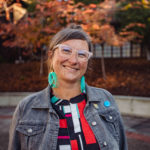Making churches more welcoming for members with dementia: ‘ We don’t want them to think they’re forgotten.’
Pictured above: Annie Dixon and her daughter Tanya Dixon attend Sunday services at Peters Chapel in Columbus, Georgia, in April. Photo: Shereen Ragheb.
By Celeste Hamilton Dennis
This story was originally published in The Atlanta Journal Constitution on May 30, 2023.
Annie Dixon has gone to Peters Chapel African Methodist Episcopal Church in Columbus, Georgia, her whole life. Her mother went there, so did her grandmother. And her chicken salad was the talk of the congregation, a guaranteed sellout at church fundraisers.
But this Sunday morning, Dixon doesn’t want to go to the small brick building across from Family Dollar. At least that’s what she says over the phone to her daughter Tanya Dixon, whom she has hung up on a couple of times already. Her daughter is not surprised; she describes her mother’s personality as “straight shot, no chaser.”
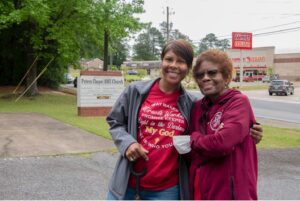
Annie Dixon and Tanya Dixon outside Peters Chapel in Columbus, Georgia, in April. Photo: Shereen Ragheb.
Peters Chapel is one of 50 Alter partners across the country. Pew by pew, they’re bringing older people back to Christian congregations where they were once familiar faces, or making sure parishioners like Annie Dixon stay. There are dementia-related pamphlets on a table in the chapel’s foyer, with more materials on a bookshelf inside. Dixon is greeted by two ushers wearing name tags if she needs assistance.
“It’s important the congregation recognizes she has these needs, because if they didn’t, they might be treating her a little bit differently. I don’t want anyone to get agitated if she’s asking the same thing 10 times,” said Tanya Dixon. “Everyone now better understands how to approach her.”
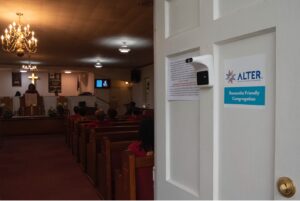
Peters Chapel is one of the churches working with Alter to make services more welcoming for people with dementia. Photo: Shereen Ragheb.
As life expectancy increases, the number of people living with Alzheimer’s and other dementias is expected to double by 2050 in the U.S. For Black Americans, who already are about twice as likely as white Americans to have dementia, the trend is even more alarming. And in Georgia, where the older adult population is growing at a greater rate than it is in the rest of the country and deaths by Alzheimer’s outpaces the national average, dementia is a looming threat.
Nurse scientist Fayron Epps founded Alter four years ago to meet the coming moment. Her goal is to keep people living with dementia connected to their faith and community, as well as increase early detection and participation in research — where Black participants have been egregiously missing from many clinical trials.
“I’m partnering with the most trusted institution in many Black communities: the church,” said Epps, a registered nurse and an associate professor at Emory University’s nursing school. “My hope is that parishioners will not just sit in the pew with their problems, but feel comfortable bringing any dementia-related and brain health concerns to their faith leader.”
Tanya Dixon first noticed signs when her mother stopped working as a maintenance crew manager at Walmart during the pandemic and sat at home by herself more. In the beginning, Annie Dixon would repeat questions. Then she progressed to asking her daughter every day: “Is today Sunday?” because that’s when she’d go to church.
Dementia symptoms vary from person to person, although short-term memory loss is the most common. Other symptoms include personality changes, apathy, difficulty communicating, getting lost, vision challenges, and acting impulsively. A progressive disease of the brain, dementia can be slowed with medication or lifestyle changes, but not stopped.
People living with dementia still have wants and needs. And routines, like going to church if you’ve always gone to church, help maintain a sense of self.
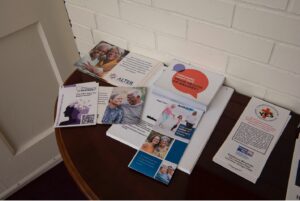
Alter provides pamphlets and information for congregants to help them learn more about dementia. Photo: Shereen Ragheb.
On this Sunday in Columbus, Annie Dixon taps her feet along with the live drums and a keyboard that accompany a few singers belting, “I’m chasing after you, no matter what I have to do, cause I need you more and more.” Pastor Sherryl King steps up to the pulpit and reads scripture. Behind her are two large monitors that display the words — one bought with Alter funds to assist with concentration. Tanya Dixon has also brought an iPad for her mother to read.
The service lasts an hour, cut in half to accommodate the shorter attention span of congregants like Dixon and some who might not be out with their diagnosis.
“A lot of times it’s needed and we’re not even aware that it’s needed,” said King, the church’s first female pastor, who leads the small congregation of mostly older women. “We tend to minister based on what we see.”
Caregivers’ comfort garden
Dementia is often talked about in gender-neutral terms. Yet the disease hits women hardest, mainly because they live longer, and impacts Black women doubly. According to the most recent Alzheimer’s Foundation report, Black women also take on a more demanding caregiving role than white caregivers.
Allen Temple AME, a historic church in Atlanta with a majority-women congregation of about 150 members, used a portion of its $1,000 Alter grant to start a caregiver group. Myra Scott organized the Majestic Care Partners three years ago, backed by the church’s first female pastor, and it’s still going strong with 10 or so members.
They meet every month to commiserate — there’s a “comfort garden” in back for them to scream, cry, or meditate — and also do creative activities like painting. Scott gives out “Best Caregiver” trophies for encouragement.
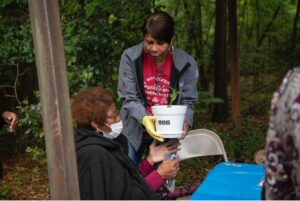
After Sunday services at Peters Chapel, Annie Dixon and her daughter Tanya Dixon join in gardening activity. Photo: Shereen Ragheb.
Scott reached out to her friend Marcia Walker when she noticed the changing behaviors of Walker’s extended family, who’ve been attending Allen Temple for over 60 years. Walker’s Aunt Marvolene would get lost driving from the grocery store to home. Her cousin Carla, who volunteered on various church committees, began writing the wrong information on envelopes sent to members. “The church rang the bell,” Walker said.
A retired transportation manager, Walker eventually took on a caregiver role full time as her aunt and cousin’s Alzheimer’s disease progressed — helping them get dressed, figuring out their bills, and taking them to church. Her aunt, who Walker says has a feisty and demanding personality, used to sing in the choir. At church, she’d hear the music and dance down the aisle with her walker, despite a hurt leg. It was a lightness her niece didn’t see much.
The journey has been stressful for Walker, but she says being a part of Majestic Care Partners has helped her not fall into depression.
“Myra and them are like, ‘We’re here for you, baby. Go ahead. Just holler at us,’” she said.
“They’ve provided me the love, support and understanding that lets me know it’s gonna be alright.”
When Epps started her research 10 years ago, looking into how faith communities and dementia intersect, she heard from numerous families that their church wasn’t understanding or their pastor had abandoned them. In Alter’s first year, Epps petitioned faith leaders to let her present to their congregations. Then COVID-19 hit.
“The pandemic made everyone become still,” she said. “When you’re still, you start noticing things.”
While a majority of the churches receiving Alter funds are in the Atlanta metro area, Alter will partner with any Black faith community, especially those from under-resourced areas.
When churches sign up, representatives choose from 16 options organized around education, worship and support, and commit to implementing eight over two years. In return, Alter provides printed dementia-related resources, access to short online worship services, and a $1,000 financial contribution drawn from private and government money.
The small team also cultivates community through check-ins and newsletters, and connects representatives with each other to share what has and hasn’t worked.
In a program evaluation from last year looking at a small sample of churches, education and worship proved the easiest to implement. Education can look like training ministry leaders on how to best communicate with someone with dementia and bringing in local memory specialists to speak. In April, Allen Temple hosted a dementia virtual reality event with another church.
For worship, large bathroom signs, name tags on ushers, and a quiet room are ways churches have made their spaces more inclusive. At the Historic First Community Church in Nashville, a black rug was removed because someone living with dementia might think it’s a hole.
It can be challenging at times to convince pastors to modify their services, but many have shortened the length and added more music, including older hymns, as music has been shown to improve cognitive function.
Not forgotten
Epps hears about the program’s impact from faith leaders often, but the team is hoping to get harder data from congregants themselves. In August, Alter is rolling out an assessment tool for church partners to give to their congregations.
In a pilot survey this spring with 99 participants from two Alter partners in Fayetteville and Macon, 42% said their church provides enough dementia-related resources, and 50% rated their knowledge of the warning signs of dementia as moderate/high.
Epps knows there’s more work to be done. As Alter grows, she’s hoping to increase capacity and put more effort into rural areas.
Some of the pushback Epps has received is about the focus on Black faith communities. While Epps is open to consulting for other faith leaders — she’s talked to those from a synagogue and a mosque — she’s unapologetic about what Alter is: a program about navigating a stigmatized disease in a community that has been historically overlooked.
At Peters Chapel, Pastor King organizes activities with art or gardening, intended to engage the brain and keep people socializing, as isolation has been linked to cognitive decline.
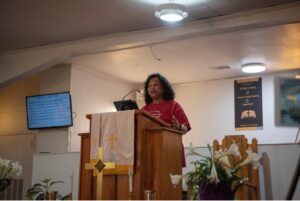
When Peters Chapel AME Pastor Sherryl King reads from Scripture, the words appear on a screen purchased by the congregation using a grant from Alter. Photo: Shereen Ragheb.
After the Sunday service, King sets up a table outside with marigold, tomato, and sweet banana pepper seeds for people to do a gardening activity. Annie Dixon watches while her daughter slips on yellow gloves and presses dirt into a flower pot, afterward giving her stickers of her initials to place on the white plastic.
“Tell them what ‘A’ stands for, Mama,” her daughter instructs.
“Leave me alone,” Annie Dixon jokes. They all laugh, accustomed to her wry sense of humor. She puts the sticker on the pot anyway.
Mother and daughter stay for a barbeque lunch in the church kitchen, where Annie Dixon playfully snaps her face mask at her daughter, and greets her cousin with an exaggerated hello. She also makes lunch plans for Monday with another churchgoer, but it’s not likely to happen.
On the way out, King walks Annie Dixon down the aisle, arms linked, aware of the responsibility she carries as a faith leader to support parishioners living with dementia. Says King: “We don’t want them to think they’re forgotten.”
Celeste Hamilton Dennis is a writer with the Investigative Reporting Program at the UC Berkeley Graduate School of Journalism. She reported this story through a grant from The SCAN Foundation.


